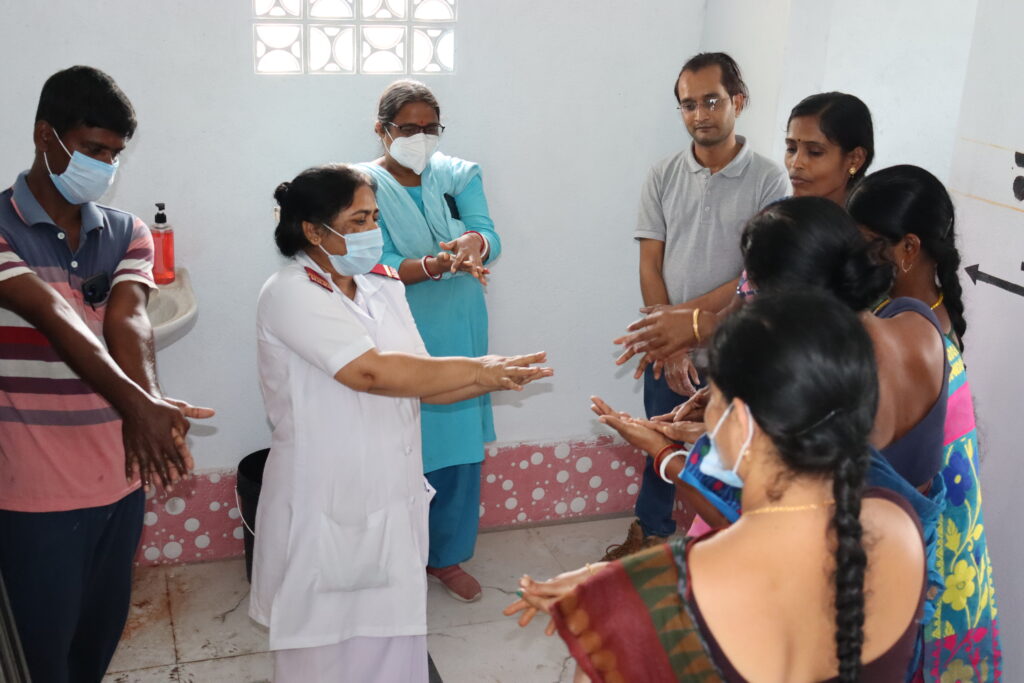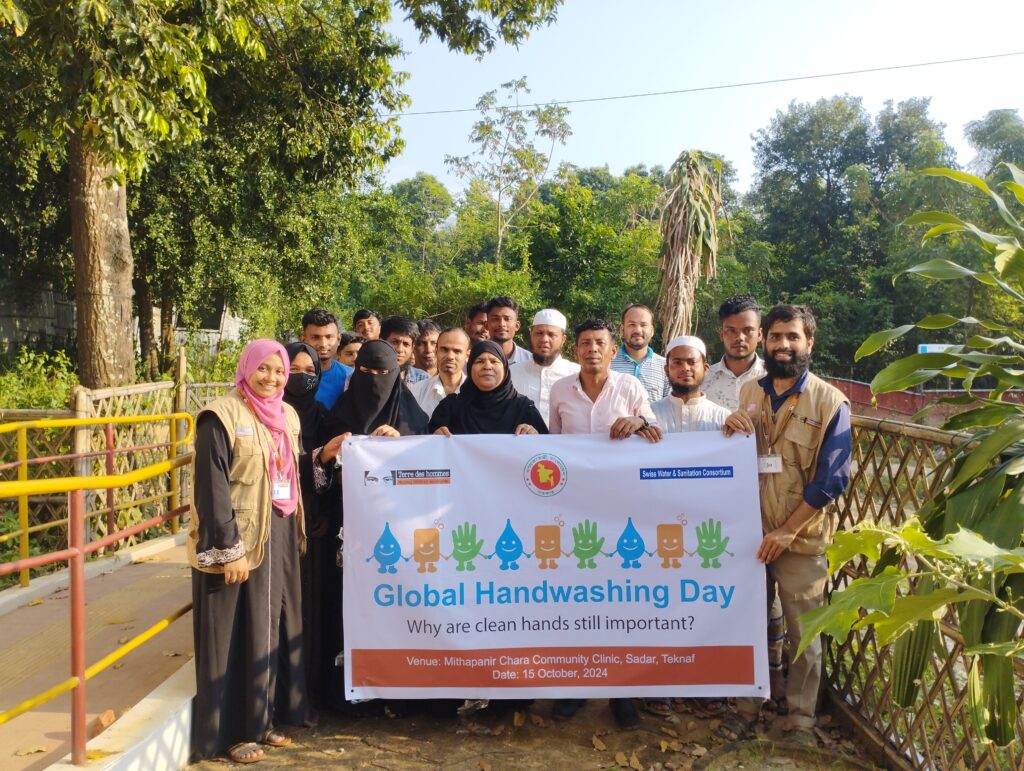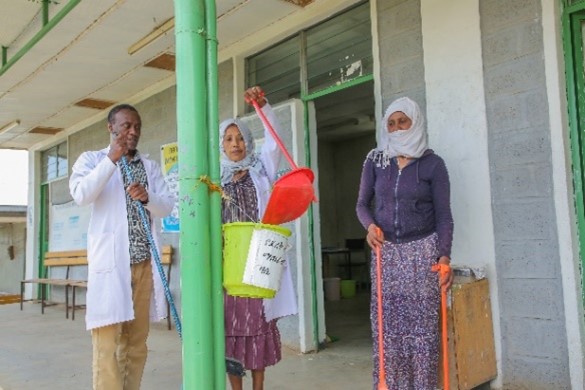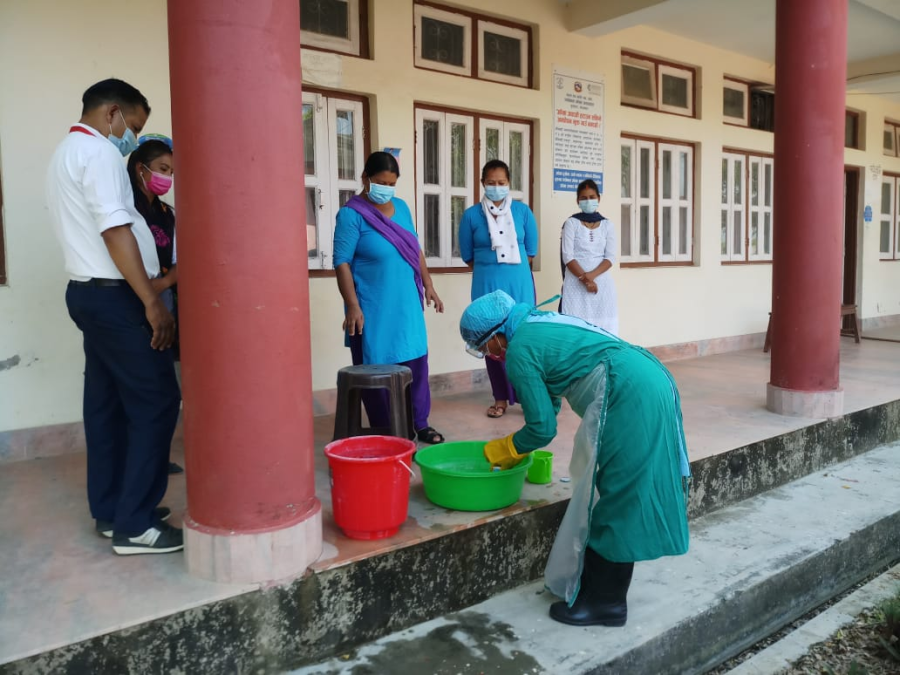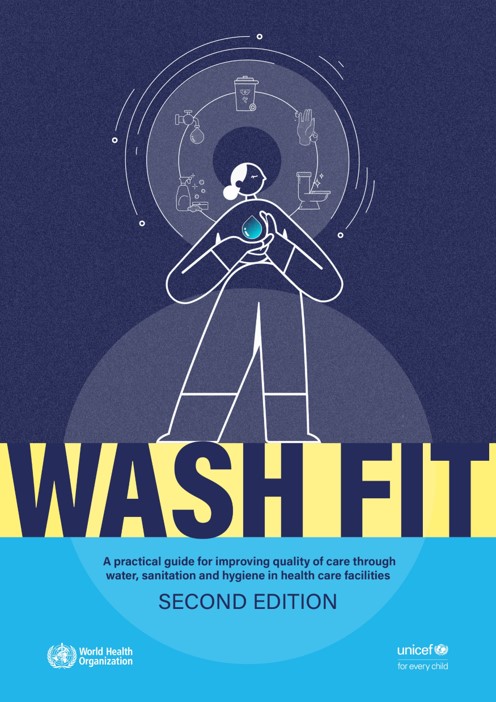Table of contents
WASH FIT in a nutshell
Community of practice
Resources
Success stories
Healthcare workers need safe working conditions and adequate infrastructure to reduce the risk of health care acquired infections and enhance the overall quality of care. The 2018 Global Call to Action on Water, Sanitation and Hygiene (WASH) in health care facilities by the UN Secretary General put the spotlight on disrepair and absence of critical infrastructure and equipment in facilities around the world, including wells, pumps, pipes, sinks, toilets and incinerators for health care waste. Building upon the Global Call, all 194 WHO Member States approved a resolution on WASH in health care facilities at the 2019 World Health Assembly that calls on countries to establish baselines and set targets, embed WASH in key health programmes and budgets, to improve and maintain infrastructure and to regularly report on progress.
Since 2011, with support from the Swiss Agency for Development and Cooperation, the eight members of the Swiss Water and Sanitation Consortium (SWSC) have channelled their know-how and resources to improve water and sanitation services in communities in Africa and Asia. The SWSC’s fourth phase (2023-2027) prioritizes WASH in institutions, both in schools and in health care facilities (HCF). SWSC members HEKS, Helvetas, Swissaid and Terre des hommes are working with the government health services in Benin, Burkina Faso, Ethiopia, India, Mali, Myanmar, Nepal and Niger to advance national roadmaps for WASH in HCF.

WASH FIT: Our Core Methodology in a Nutshell
At the core of SWSC’s approach to WASH in Health Care Facilities (HCF) is the Water and Sanitation for Health Facility Improvement Tool (WASH FIT) launched in 2018 by WHO and UNICEF. WASH FIT is a risk-based management tool for health care facilities, covering key aspects of water, sanitation, hand hygiene, environmental cleaning, health care waste management and selected aspects of energy, building and facility management.
The WASH FIT process:
- Provides a framework to develop, monitor and continuously implement an improvement plan (covering infrastructure, behaviours, and operation and maintenance) and prioritize specific WASH actions that are climate-resilient, equitable and inclusive;
- Guides planning and implementation of WASH improvements as part of wider quality improvement efforts and to meet local, national and/or global standards;
- Supports the implementation of IPC standard and transmission-based precautions according to national guidelines and standard operating procedures (SOPs); and
- Facilitates multisectoral actions by bringing together all those who share responsibility for providing WASH services, including legislators and policymakers, district1 health officers, hospital administrators, water and sanitation engineers, climate and environmental specialists, and users.
The SWSC member organisations and local partners work with health care facility management committees and other local leaders to form WASH FIT teams in each HCF and support them to lead risk assessments and to develop Improvement Plans covering infrastructure, operation and maintenance and staff behaviours and practices. The plans are presented to local government and district health authorities to inform budgeting and resource allocation to improve the WASH conditions.
Advocacy efforts by SWSC members have raised the profile of the WASH FIT methodology in several countries as an opportunity for health policy makers and regulators to monitor needs and progress at the sub-national level. This contributes to resource prioritisation, budgeting and investments for WASH improvements.
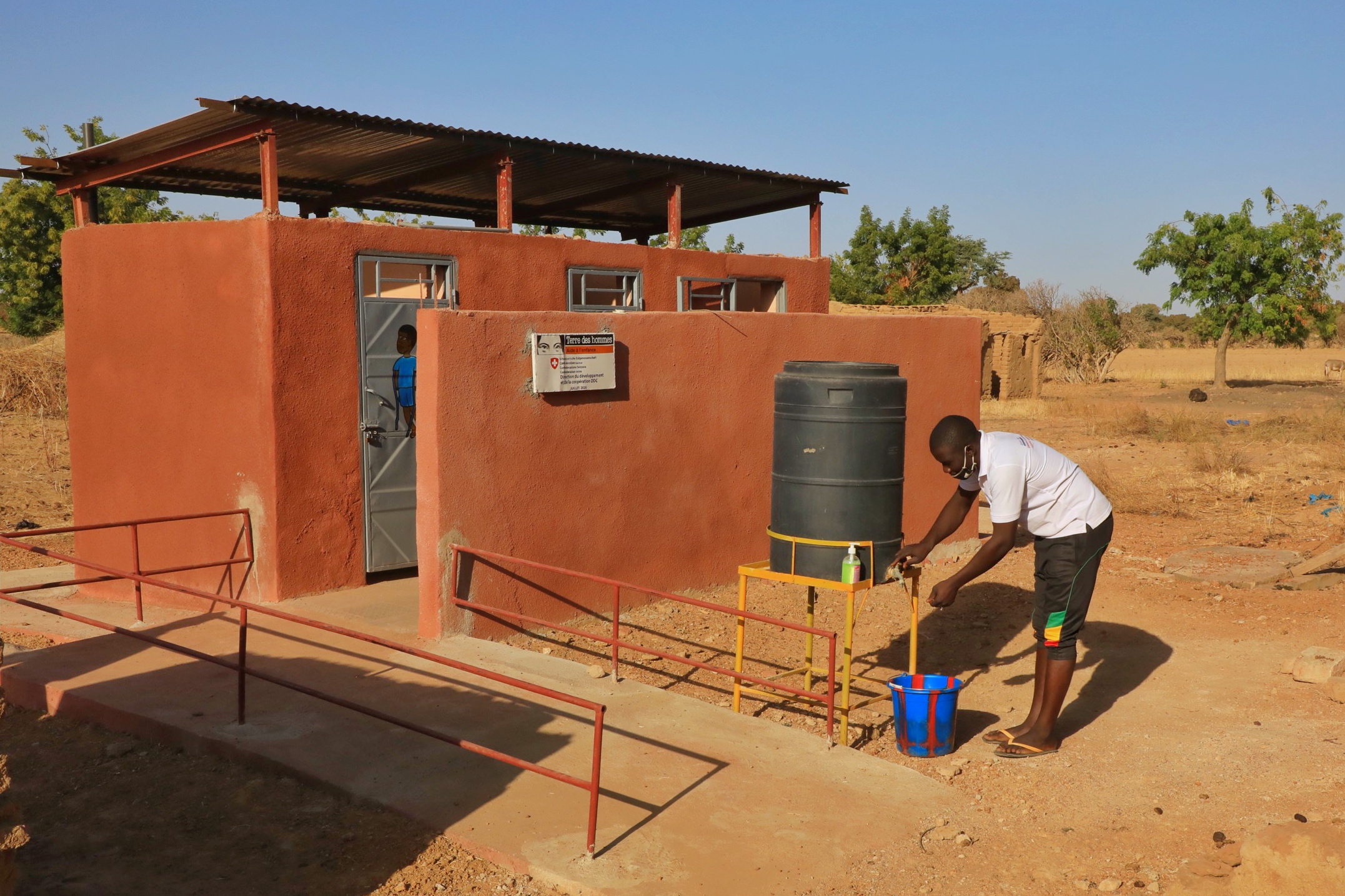
In the past five years, SWSC members Terre des hommes, HEKS, Swissaid and Helvetas have worked in over 100 health care facilities in Africa and Asia, improving WASH service levels per indicators recommended by the WHO / UNICEF Joint Monitoring Programme (JMP).
Key achievements include:
- Key actor in strengthening the healthcare system with the WASH FIT approach in Benin, Burkina Faso, Ethiopia, Myanmar, Nepal, Niger, Mali.
- Adapting WASH FIT to the Government of Mali’s national strategy on COVID response
- Technical input to national standards and reference materials as part of the national WASH in HCF Task Force (Ministry of Health, Government of Mali);
- Successful advocacy to influence municipalities, based on WASH FIT Improvement Plans, to mobilise and allocate funding and equipment to improve WASH Services in HCF in Mali, Myanmar and Nepal;
SWSC members are converging efforts to achieve:
- Improvements toward “basic” level WASH services, including delivery rooms
- Integration of WASH FIT in local governance planning mechanisms
- Elevating the standing of cleaners to bolster safe, quality care
- Costing tools adapted for HCF management committees
- Innovative tools for characterization and measuring health care waste
- Innovative approaches to hygiene behaviour change using the RANAS method
- Collaborating with health ministries to integrate indicators recommended by the United Nations Joint Monitoring Programme for Water Supply, Sanitation and Hygiene (JMP) in national monitoring mechanisms
Repository: Guidance Documents and Further Reading
Info Card on WASH in HCF:
Key Global Resources
Swiss Water and Sanitation Consortium members have contributed to the following global publications on WASH in HCF:
The Swiss Water and Sanitation Consortium is also a member of advisory committees of the WASH in Health Care Facilities Global Community of Practice and the WASH Health Facility Data Exchange (WHdx) platform.
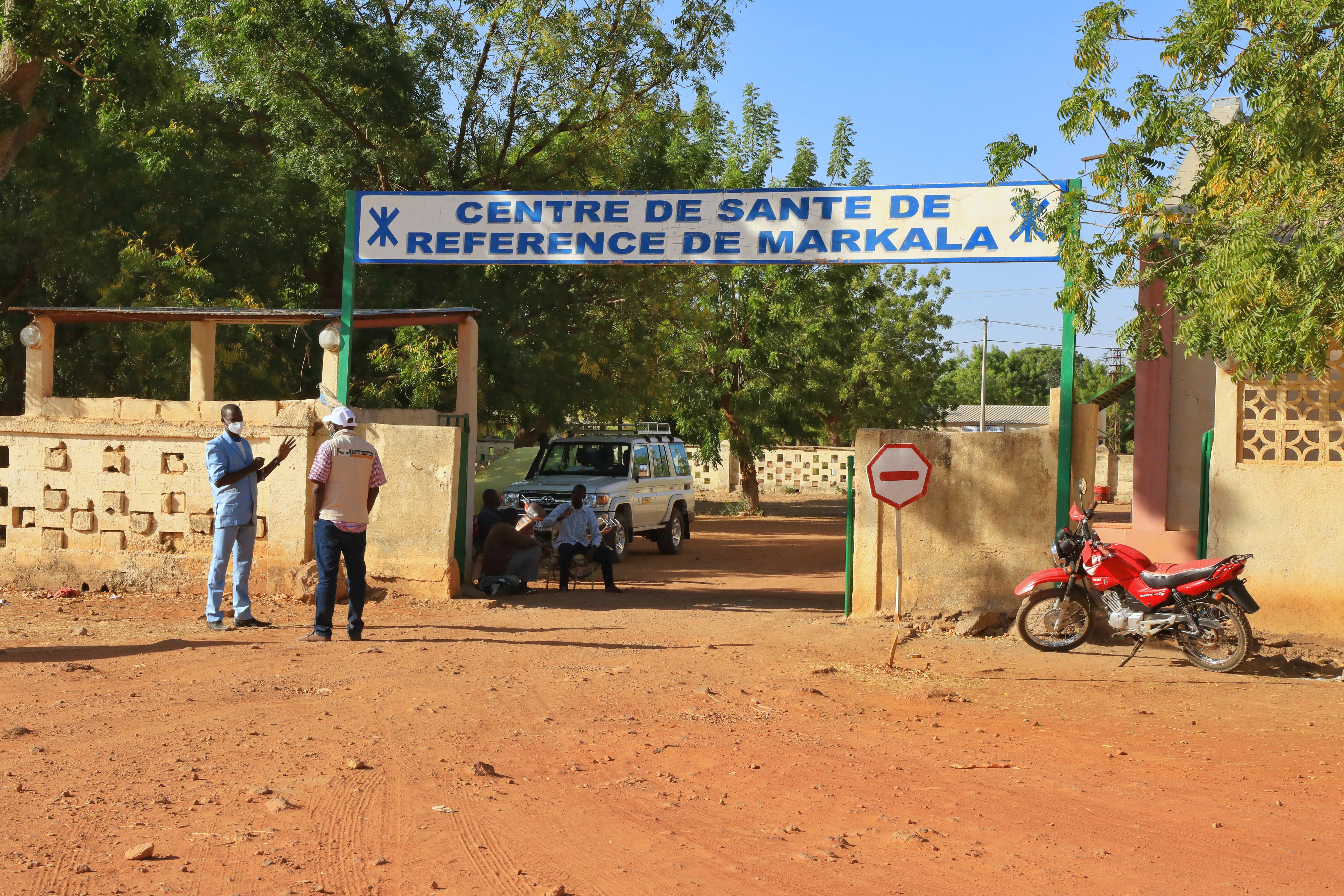
Success stories
- Community Mobilization: By implementing the WASH FIT approach, the HEKS project team in Ethiopia helped mobilize the community to improve waste management at the Tsigereda Health Center. The center’s WASH FIT team, led by a 24 year-old mother from the community, identified the lack of a waste disposal facility as a key risk and began construction of a new protected, lined waste pit and other facilities with support from the project.
- Increased Government Resources for WASH in HCF: Terre des hommes in Nepal promotes the WASH FIT process to increase awareness of the importance of WASH services for infection prevention and control (IPC). Thanks to WASH FIT assessments in 8 HCF in the Bardiya district, local authorities became aware of the WASH gaps in WASH services and increased annual budget allocations. This includes augmenting IPC training and supplies ($1000), provision of water quality test kits ($200/HCF) as well as O&M cost for WASH (from $1000 to $5000). Municipal authorities also support individual HCF Improvement Plans by providing 25% cash contributions for new infrastructures.
- Municipal and Community Commitment to Realise WASH Improvements: Terre des hommes in Mali accompanied the Kokry HCF (Segou Region) to go from No Service to a Basic Sanitation Service using WASH FIT. Toilets were inexistant in the Kokry HCF when the team initiated the WASH FIT process through peer learning visits between HCF management committees. Kokry’s WASH FIT team elaborated an Improvement Plan and succeeded to raise $4,000 to construct Ventilated Improved Pits, gender segregated toilets for staff and patients with menstrual hygiene management facilities and disability access. This success story triggered the replication of the WASH FIT process to nine additional health care facilities in the Segou Region.


